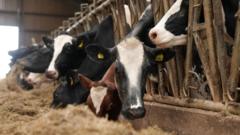Are Vaccinated Cattle Free from Bluetongue Restrictions?

Understanding the New Bluetongue Virus Regulations for Welsh Livestock
The recent announcement regarding the movement of vaccinated sheep and cattle from Wales to English livestock markets marks a significant shift in agricultural policy. As of August 18, Welsh livestock that have received vaccinations against the bluetongue virus can now participate in sales within 12 miles of the border. This change aims to bolster the breeding stock market while managing the risk of disease transmission. In this article, we will delve into the implications of these changes, the bluetongue virus itself, and what it means for farmers and livestock traders in both Wales and England.
What is Bluetongue Virus?
Bluetongue is a viral disease primarily affecting ruminants, including sheep and cattle. The disease is transmitted by midges, making it a concern for farmers, particularly in regions where these insects are prevalent. While bluetongue poses no threat to human health or food safety, it can lead to severe health issues in livestock, including fever, swelling, and, in some cases, death.
Understanding the nature of bluetongue is crucial for livestock owners, as the disease can significantly impact herd health and farm profitability. The virus has several serotypes, with varying degrees of virulence, which can complicate vaccination strategies and disease management.
Impact of Vaccination on Livestock Movement
The new regulations allow fully vaccinated Welsh livestock to attend specific English markets, including Bishops Castle, Hereford, Kington, Ludlow, Market Drayton, Oswestry, Ross-on-Wye, and Shrewsbury. However, these markets will conduct dedicated sales exclusively for vaccinated animals, ensuring that health protocols are strictly adhered to. This approach aims to facilitate safe trading while minimizing the risk of disease spread.
Farmers and traders should be aware of the specific conditions that will govern these sales. For instance, any animals returning to Wales after the sales must do so within the same day and comply with the general licensing conditions set by the Welsh government. This structured approach emphasizes the importance of maintaining biosecurity while allowing farmers access to vital markets.
Challenges of Bluetongue Vaccination in Wales
Despite the new regulations, the uptake of bluetongue vaccination among Welsh livestock has been relatively low. Recent figures indicate that fewer than 1% of Wales' eight million sheep and between 5-10% of the cattle population have been vaccinated. This raises concerns about the overall effectiveness of the vaccination strategy and the potential for disease outbreaks.
The Welsh government has acknowledged the need to strike a balance between facilitating trade and managing disease risks. Chief Veterinary Officer for Wales, Richard Irvine, emphasized the importance of stakeholder discussions in shaping the phased approach to the bluetongue policy. These discussions reflect the agricultural community's concerns regarding the economic implications of strict movement restrictions, which could be catastrophic for cross-border trade.
The Economic Implications for Farmers
The agricultural sector is a vital component of the Welsh economy, and the movement restrictions due to bluetongue virus pose significant challenges for farmers. Livestock trading is crucial for maintaining healthy profit margins, particularly for breeders looking to sell high-quality animals. The potential loss of access to English markets could severely impact farmers' livelihoods.
Farmers must adapt to these changes by considering the following strategies:
- Increase Vaccination Rates: Farmers should prioritize vaccinating their livestock to enhance herd immunity and ensure compliance with new movement regulations.
- Participate in Approved Sales: Engaging in dedicated sales for vaccinated livestock can open new avenues for revenue generation.
- Stay Informed: Regularly check for updates on bluetongue policies and market conditions to make informed decisions.
Future Considerations for Welsh Livestock Markets
As the situation evolves, further adjustments to the bluetongue policy are being considered. One potential development is the establishment of “bluetongue approved green markets” within Wales. These markets would allow for the sale of vaccinated livestock from both England and Wales, expanding trading opportunities for farmers.
Livestock markets will have the opportunity to apply for approval starting mid-September, which could lead to a more integrated trading environment. This move is designed to support the agricultural community while maintaining stringent health protocols to mitigate disease risks.
FAQs About Bluetongue Virus and Livestock Movement
What are the symptoms of bluetongue in livestock?
Symptoms of bluetongue can include fever, swelling of the face and tongue, nasal discharge, and lameness. In severe cases, the disease can lead to death. It's crucial for farmers to monitor their livestock for these signs and take action promptly.
How can farmers ensure their livestock are vaccinated?
Farmers should work closely with their veterinarians to develop a vaccination schedule tailored to their herd's needs. Regular health checks and monitoring vaccination records can help ensure compliance with bluetongue vaccination requirements.
What should I do if my livestock shows symptoms of bluetongue?
If livestock exhibit signs of bluetongue, farmers should immediately isolate the affected animals and contact a veterinarian for diagnosis and treatment options. Early intervention can be critical in managing the disease's spread.
How does bluetongue affect trade between England and Wales?
The movement restrictions due to bluetongue virus can significantly impact trade between England and Wales. Farmers must navigate these regulations carefully to ensure compliance while maintaining access to lucrative markets.
Conclusion
The recent changes to livestock movement regulations in Wales present both challenges and opportunities for farmers. By prioritizing vaccination and understanding the implications of bluetongue virus management, livestock owners can navigate this evolving landscape more effectively. As the agricultural community adapts to these changes, it is essential to remain informed and proactive in ensuring both animal health and economic viability.
As we look ahead, how will the agricultural sector adapt to the ongoing challenges posed by bluetongue and other diseases? The future of livestock trading may depend on innovative solutions and collaborative efforts within the farming community. #Agriculture #Livestock #BluetongueVirus
Published: 2025-08-04 14:35:15 | Category: wales



